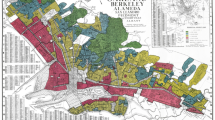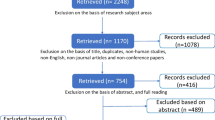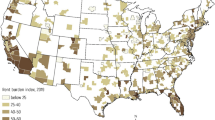Abstract
The physical environment in which individuals live has important implications for their access to resources and services. The current study examined the role of several features of neighborhoods, such as perceived walkability and neighborhood appearance, in promoting recreational wellbeing, and resulting in impacts on physical wellbeing, happiness, and life satisfaction of residents. Survey responses (N = 1392) were collected in two distinct geographical areas and, using structural equation modeling, relationships between neighborhood physical environments and resident outcomes were explored. Results indicated perceived walkability (access to services) and neighborhood appearance (upkeep and attractiveness) played a significant role in increasing recreational wellbeing. Also, recreational wellbeing was positively related to individuals’ physical wellbeing. Lastly, physical wellbeing was positively associated with happiness and life satisfaction. Together, these findings suggest community planners could use several practical neighborhood improvements to improve the overall health, happiness, and life satisfaction of their residents.

Similar content being viewed by others
Change history
07 March 2018
The original version for this paper unfortunately contained errors in the Author group, affiliation, and in the abstract.
References
Adkins, A., Dill, J., Luhr, G., & Neal, M. (2012). Unpacking walkability: testing the Influence of urban design features on perceptions of walking environment attractiveness. Journal of Urban Design, 17(4), 499–510. https://doi.org/10.1080/13574809.2012.706365.
Argyle, M. (1999). Causes and correlates of happiness. In D. Kahneman, E. Diener, & N. Schwarz (Eds.), Well-being: Foundations of Hedonic Psychology (pp. 353–373). New York: Russell Sage Foundation.
Bacon, L. (2010). Health at every size: The Surprising Truth about Your Weight. Dallas: BenBella Books.
Bauman, A. E., Reis, R. S., Sallis, J. F., Wells, J. C., Loos, R. J., & Martin, B. W. (2012). Correlates of physical activity: why are some people physically active and others not? The Lancet, 380(9838), 258–271. https://doi.org/10.1016/S0140-6736(12)60735-1.
Blair, S. N. (1993). Body weight change, all-cause mortality, and cause-specific mortality in the multiple risk factor intervention trial. Annals of Internal Medicine, 119(7_Part_2), 749. https://doi.org/10.7326/0003-4819-119-7_Part_2-199310011-00024.
Boepple, L., Ata, R. N., Rum, R., & Thompson, J. K. (2016). Strong is the new skinny: a content analysis of fitspiration websites. Body Image, 17, 132–135. https://doi.org/10.1016/j.bodyim.2016.03.001.
Boyce, C. (2010). Walkability, social inclusion and social isolation and street redesign. Built Environment, 36(4), 461–473. https://doi.org/10.2148/benv.36.4.461.
Canter, D. (1977). The psychology of place. Oxford: St Martin’S Press.
Casagrande, S. S., Whitt-Glover, M. C., Lancaster, K. J., Odoms-Young, A. M., & Gary, T. L. (2009). Built environment and health behaviors among african americans: a systematic review. American Journal of Preventive Medicine, 36(2), 174–181. https://doi.org/10.1016/j.amepre.2008.09.037.
Cerin, E., Saelens, B. E., Sallis, J. F., & Frank, L. D. (2006). Neighborhood environment walkability scale: validity and dev. medicine & science in sports & exercise. Medicine and Science in Sports and Exercise, 38(9), 1682–1691.
Cheshmehzangi, A. (2015). The reinvention of liveability in public places: interaction mapping analysis of central nottingham’s improved walkability. Journal of Human Behavior in the Social Environment, 25(5), 426–440. https://doi.org/10.1080/10911359.2014.980594.
Dergance, J. M., Calmbach, W. L., Dhanda, R., Miles, T. P., Hazuda, H. P., & Mouton, C. P. (2003). Barriers to and benefits of leisure time physical activity in the elderly: differences across cultures. Journal of the American Geriatrics Society, 51(6), 863–868. https://doi.org/10.1046/j.1365-2389.2003.51271.x.
Diener, E., Emmons, R. A., Larsen, R. J., & Griffin, S. (1985). The satisfaction with life scale. Journal of Personality Assessment, 49(1), 71–75. https://doi.org/10.1207/s15327752jpa4901_13.
Diener, E., Oishi, S., & Lucas, R. E. (2003). Personality, culture, and subjective well-being: emotional and cognitive evaluations of life. Annual Review of Psychology, 54(1), 403–425.
du Toit, L., Cerin, E., Leslie, E., & Owen, N. (2007). Does walking in the neighbourhood enhance local sociability? Urban Studies, 44(9), 1677–1695. https://doi.org/10.1080/00420980701426665.
Duncan, D. T., Aldstadt, J., Whalen, J., Melly, S. J., & Gortmaker, S. L. (2011). Validation of walk score® for estimating neighborhood walkability: an analysis of four US metropolitan areas. International Journal of Environmental Research and Public Health, 8(11), 4160–4179. https://doi.org/10.3390/ijerph8114160.
Felce, D., & Perry, J. (1995). Quality of life: Its definition and measurement. Research in Developmental Disabilities, 16(1), 51–74. https://doi.org/10.1016/0891-4222(94)00028-8.
Flanagan, J. (1982). Measurement of quality of life: current state of the art. Archives of Physical Medicine and Rehabilitation, 63(2), 56–59.
Frank, L. D., Engelke, P., & Schmid, T. (2003). Health and community design: the impact of the built environment on physical activity. Washington, D.C.: Island Press.
Frank, L. D., Schmid, T. L., Sallis, J. F., Chapman, J., & Saelens, B. E. (2005). Linking objectively measured physical activity with objectively measured urban form: Findings from SMARTRAQ. American Journal of Preventive Medicine, 28(2, Supplement 2), 117–125. https://doi.org/10.1016/j.amepre.2004.11.001.
Garrett, G. (1990). Health and happiness. In Older People: Their Support and Care (pp. 11–18). Macmillan Education UK. Retrieved from http://link.springer.com/chapter/10.1007/978-1-349-11253-1_2.
Gong, B. (1998). Chinese leisure. Shanghai: Shanghai Antique Press.
Graham, C. (2008). Happiness and health: lessons—and questions—for public policy. Health Affairs, 27(1), 72–87. https://doi.org/10.1377/hlthaff.27.1.72.
Guadagnoli, E., & Velicer, W. F. (1988). Relation to sample size to the stability of component patterns. Psychological Bulletin, 103(2), 265–275. https://doi.org/10.1037/0033-2909.103.2.265.
Heath, G. W., Parra, D. C., Sarmiento, O. L., Andersen, L. B., Owen, N., Goenka, S., & Brownson, R. C. (2012). Evidence-based intervention in physical activity: lessons from around the world. The Lancet, 380(9838), 272–281. https://doi.org/10.1016/S0140-6736(12)60816-2.
Hinton, P. R., Brownlow, C., McMurray, I., & Cozens, B. (2004). SPSS explained. East Sussex: Routledge.
Hu, L. Z., & Bentler, P. M. (1999). Cutoff criteria for fit indexes in covariance structure analysis: conventional criteria versus new alternatives. Structural Equation Modeling, 6(1), 1–55. https://doi.org/10.1080/10705519909540118.
Jeffres, L. W., Bracken, C. C., Jian, G., & Casey, M. F. (2009). The Impact of Third Places on Community Quality of Life. Applied Research in Quality of Life, 4(4), 333. https://doi.org/10.1007/s11482-009-9084-8.
Jun, H.-J., & Hur, M. (2015). The relationship between walkability and neighborhood social environment: The importance of physical and perceived walkability. Applied Geography, 62, 115–124. https://doi.org/10.1016/j.apgeog.2015.04.014.
Kerr, J., Norman, G., Millstein, R., Adams, M. A., Morgan, C., Langer, R. D., & Allison, M. (2014). Neighborhood environment and physical activity among older women: findings from the San Diego Cohort of the Women’s Health Initiative. Journal of Physical Activity and Health, 11(6), 1070–1077. https://doi.org/10.1123/jpah.2012-0159.
Kim, J., Lee, S., Chun, S., Han, A., & Heo, J. (2016). The effects of leisure-time physical activity for optimism, life satisfaction, psychological well-being, and positive affect among older adults with loneliness. Annals of Leisure Research, 0(0), 1–10. https://doi.org/10.1080/11745398.2016.1238308.
Kline, R. B. (2015). Principles and practice of structural equation modeling. New York: Guilford publications.
Kohl 3rd, H. W., Craig, C. L., Lambert, E. V., Inoue, S., Alkandari, J. R., Leetongin, G., & Kahlmeier, S. (2012). The pandemic of physical inactivity: global action for public health. The Lancet, 380(9838), 294–305. https://doi.org/10.1016/S0140-6736(12)60898-8.
Koohsari, M. J., Sugiyama, T., Lamb, K. E., Villanueva, K., & Owen, N. (2014). Street connectivity and walking for transport: Role of neighborhood destinations. Preventive Medicine, 66, 118–122. https://doi.org/10.1016/j.ypmed.2014.06.019.
Lee, C., & Moudon, A. V. (2006). The 3Ds + R: Quantifying land use and urban form correlates of walking. Transportation Research Part D: Transport and Environment, 11(3), 204–215. https://doi.org/10.1016/j.trd.2006.02.003.
Leslie, E., Sparling, P. B., & Owen, N. (2001). University campus settings and the promotion of physical activity in young adults: lessons from research in Australia and the USA. Health Education, 101(3), 116–125. https://doi.org/10.1108/09654280110387880.
Leyden, K. M., Goldberg, A., & Duval, R. D. (2011a). The built environment, maintenance of the public sphere and connections to others and to place: an examination of 10 international cities. Journal of Urbanism: International Research on Placemaking and Urban Sustainability, 4(1), 25–38. https://doi.org/10.1080/17549175.2011.559946.
Leyden, K. M., Goldberg, A., & Michelbach, P. (2011b). Understanding the pursuit of happiness in ten major cities. Urban Affairs Review, 47(6), 861–888. https://doi.org/10.1177/1078087411403120.
Lovasi, G. S., Schwartz-Soicher, O., Quinn, J. W., Berger, D. K., Neckerman, K. M., Jaslow, R., et al. (2013). Neighborhood safety and green space as predictors of obesity among preschool children from low-income families in New York City. Preventive Medicine, 57(3), 189–193. https://doi.org/10.1016/j.ypmed.2013.05.012.
Lund, H. (2002). Pedestrian environments and sense of community. Journal of Planning Education and Research, 21(3), 301–312. https://doi.org/10.1177/0739456X0202100307.
Lyubomirsky, S., & Lepper, H. S. (1999). A measure of subjective happiness: preliminary reliability and construct validation. Social Indicators Research, 46(2), 137–155. https://doi.org/10.1023/A:1006824100041.
Mantero, J. C. (2000). Leisure and tourism. In E. Garcia & F. Lobo (Eds.), Leisure in a globalised society. Servico Social Do Comercio: Sao Paulo.
Measuring the Street. (2012). Retrieved March 30, 2017, from http://www.nyc.gov/html/dot/downloads/pdf/2012-10-measuring-the-street.pdf.
Morales, L. (2010). Social Offerings, Openness Key to Community Attachment. Retrieved March 30, 2017, from http://www.gallup.com/poll/144476/Social-Offerings-Openness-Key-Community-Attachment.aspx.
Moudon, A. V., Lee, C., Cheadle, A. D., Garvin, C., Johnson, D. B., Schmid, T. L., & Weathers, R. D. (2007). Attributes of environments supporting walking. American Journal of Health Promotion, 21(5), 448–459. https://doi.org/10.4278/0890-1171-21.5.448.
Newman, S. J., & Duncan, G. J. (1979). Residential problems, dissatisfaction, and mobility. Journal of the American Planning Association, 45(2), 154–166. https://doi.org/10.1080/01944367908976953.
Nunnally, J. C. (1967). Psychometric Theory (2nd ed.). New York: McGraw-Hill.
Olvera, N., Smith, D. W., Lee, C., Liu, J., Lee, J., Kellam, S., & Kim, J.-H. (2012). Hispanic maternal and children’s perceptions of neighborhood safety related to walking and cycling. Health & Place, 18(1), 71–75. https://doi.org/10.1016/j.healthplace.2011.08.022.
Penedo, F. J., & Dahn, J. R. (2005). Exercise and well-being: a review of mental and physical health benefits associated with physical activity. Retrieved November 25, 2016, from http://journals.lww.com/co-psychiatry/Fulltext/2005/03000/Exercise_and_well_being__a_review_of_mental_and.13.aspx.
Pickett, A. C., & Cunningham, G. B. (2016). Physical activity for every body: a model for managing weight stigma and creating body-inclusive spaces. Quest, 69(1), 19–36. https://doi.org/10.1080/00336297.2016.1145129.
Pinquart, M., & Silbereisen, R. K. (2010). Patterns of fulfilment in the domains of work, intimate relationship, and leisure. Applied Research in Quality of Life, 5(2), 147-164.
Pritchard, E., Barker, A., Day, L., Clemson, L., Brown, T., & Haines, T. (2015). Factors impacting the household and recreation participation of older adults living in the community. Disability and Rehabilitation, 37(1), 56–63. https://doi.org/10.3109/09638288.2014.902508.
Richard, L., Gauvin, L., Gosselin, C., & Laforest, S. (2009). Staying connected: neighbourhood correlates of social participation among older adults living in an urban environment in Montréal, Québec. Health Promotion International, 24(1), 46–57. https://doi.org/10.1093/heapro/dan039.
Russell, R. V. (1990). Recreation and quality of life in old age: A causal analysis. The Journal of Applied Gerontology, 9, 77–90.
Saelens, B. E., & Handy, S. L. (2008). Built environment correlates of walking: a review. Medicine and Science in Sports and Exercise, 40(7 Suppl), S550–S566. https://doi.org/10.1249/MSS.0b013e31817c67a4.
Sallis, J. F. & N. Owen (1997). Ecological models. San Francisco: Jossey-Bass Publishers.
Sallis, J. F., Cervero, R. B., Ascher, W., Henderson, K. A., Kraft, M. K., & Kerr, J. (2006). An ecological approach to creating active living communities. Annual Review of Public Health, 27, 297–322.
Sallis, J. F., Prochaska, J. J., Taylor, W. C., Hill, J. O., & Geraci, J. C. (1999). Correlates of physical activity in a national sample of girls and boys in Grades 4 through 12. Health Psychology, 18(4), 410–415. https://doi.org/10.1037/0278-6133.18.4.410.
Waters, L. E., & Moore, K. A. (2002). Reducing latent deprivation during unemployment: The role of meaningful leisure activity. Journal of Occupational and Organizational Psychology, 75, 15–32.
Wearing, B. (1998). Leisure and feminist theory. London: Sage.
West, S. G., Finch, J. F., & Curran, P. J. (1995). Structural equation models with nonnormal variables: Problems and remedies. In R. H. Hoyle (Ed.), Structural equation modeling: Concepts, issues, and applications (pp. 56–75). Thousand Oaks: Sage.
Wold, B., Duda, J. L., Balaguer, I., Smith, O. R. F., Ommundsen, Y., Hall, H. K., & Krommidas, C. (2013). Comparing self-reported leisure-time physical activity, subjective health, and life satisfaction among youth soccer players and adolescents in a reference sample. International Journal of Sport and Exercise Psychology, 11(4), 328–340. https://doi.org/10.1080/1612197X.2013.830433.
Wood, L., & Giles-Corti, B. (2008). Is there a place for social capital in the psychology of health and place? Journal of Environmental Psychology, 28(2), 154–163. https://doi.org/10.1016/j.jenvp.2007.11.003.
Yarnal, C. M., Chick, G., & Kerstetter, D. L. (2008). ‘I did not have time to play growing up…so this is my play time. It’s the best thing I have ever done for myself: What is play to older women? Leisure Sciences, 30(3), 235–252.
Zhu, X., Yu, C.-Y., Lee, C., Lu, Z., & Mann, G. (2014). A retrospective study on changes in residents’ physical activities, social interactions, and neighborhood cohesion after moving to a walkable community. Preventive Medicine, 69(Supplement), S93–S97. https://doi.org/10.1016/j.ypmed.2014.08.013.
Acknowledgements
This work was supported by the Ministry of Education of the Republic of Korea and the National Research Foundation of Korea (NRF-2016S1A3A2924563).
Author information
Authors and Affiliations
Corresponding author
Ethics declarations
Conflict of Interest
The authors declare that they have no conflict of interest.
Ethical Approval
All procedures performed in this study involving human participants were drafted according to the principles embodied in the Declaration of Helsinki and was approved by the Institutional Review Board of the Texas A&M University.
Informed Consent
Informed consent was obtained from all individual participants included in the study.
Additional information
The original version of this article was revised: Modifications have been made in the Author group, affiliation, and in the abstract. Full information regarding corrections made can be found in the correction article for this article.
Rights and permissions
About this article
Cite this article
Kwon, M., Pickett, A.C., Lee, Y. et al. Neighborhood Physical Environments, Recreational Wellbeing, and Psychological Health. Applied Research Quality Life 14, 253–271 (2019). https://doi.org/10.1007/s11482-018-9591-6
Received:
Accepted:
Published:
Issue Date:
DOI: https://doi.org/10.1007/s11482-018-9591-6




